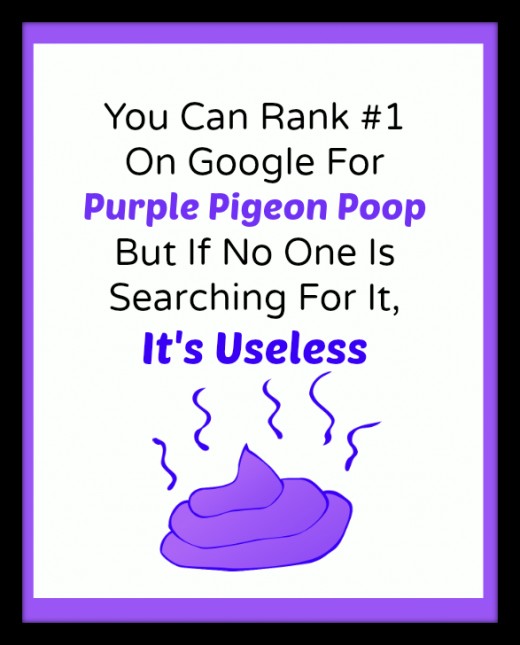Google indexed but not a single visitor from Google search
- Jean Harrisposted 8 years ago
0
Google indexed my new hubs quickly but, according to the hubpages traffic source report, have not sent a single visitor to any of my hubs yet. Even Yandex has, but not Google.
Just curious, is there a known issue for Google traffic not appearing on hubpage reports or are they really ignoring my hubs for now? I don't have this problem on my own sites, in fact Google is usually the first to send traffic and usually start doing so within 24 hrs.
I don't see my hubs linked to from anywhere on hubpages beside my profile page which masks the links so they don't show to Google. Could it be a complete lack of any internal links? I have not linked to these from any outside site, yet.
I understand how search works, I'm just curious as to the experience of other hubbers recently.My last hub had an android.Google seach before it was approved. I don't know how that happened.
Traffic from Google isn't very good from articles that haven't been moved to the vertical sites; that could be why. You articles also haven't been around for very long, so give them some time.
It depends what you're ranking for. If no one is Googling that topic OR there are millions of articles in competition, then it's unlikely you'll get traffic.

For instance, if I rank number 1 for Susannah Birch - it doesn't mean much, as hardly anyone Googles Susannah Birch. It's a pointless keyword victory.
On the flip side, if you write an article on a saturated topic like weight loss or finance, your article may rank hundreds of pages into Google search due to the stiff competition and never be found by searchers.I presume you are referring to your hub on "free metal textures" and my search put your hub on Page 10, not bad unless you're used to be on the first page as soon as you publish. Give it time, improve it and you'll have a good chance for Page 1. There is about 1,530,000 searching for this topic.
I think you are expecting too much too fast. The goal here is to get Hubs to niche sites. If you have a Hub on a niche site for a few weeks and see no Google traffic, then it is time to wonder.
The main HP domain is basically a slush pile at this point. All of the good content has been cherry picked for the niche sites, and if your Hubs are good they will be moving too. While they are on HubPages they are somewhat handicapped, stuck on an ever-weakening domain with a hodge-podge of lower-quality content.
This isn't like your own sites, where you've built some authority on a single topic and Google may recognize more quickly that your page has value.
Work on getting your Hubs to niche sites. You'll see Google traffic. Curators typically look at new Hubs within a week or two of publication, and you can submit them yourself every two weeks (though you never want to submit a Hub until you're sure the curators have passed it by. Then, update and submit.)Patience is the key. It takes time to get Google traffic, months and even years to get it consistently. Being on a niche site will speed it up.
I was surprised to find your hamster article is already on page 2 of Google, despite being relatively new and not on a niche site?
Can you repeat your recommendations on how to have an article noticed by Google even faster? I published a new article on corn snakes Sunday and it is not yet on Google.The internal link structure of a site typically helps boost articles out of the gate because the site itself links to new articles from several places. These are typically the index page, the category page and quite often a new articles widget. Hubpages did not provide this initial boost and even my profile page cannot help the articles it links to because of site design.
I understand patience, I understand how search works, and yes I expected hubpages to do some of the initial heavy lifting but that's not happening. If nothing changes after 7 days, and the articles don't float high enough to receive traffic, it's likely they never will until they get enough "heavy lifting" incoming links from elsewhere.
About my articles, they aren't random postings that might not be getting searched. They were to gather data and written for that purpose. Free metal textures and names for characters are two of the top ranking articles on Google according to 3rd party monitoring services. This means Google is considering those topics important to hubpages and is very generous with allowing 2nd, 3rd, 4th entries in search from the same site(authority status).
The Hamster article was a compilation of articles I had previously written but did not have a current home for, also a top topic for hubpages according to Google. In short I took a shot at some easily obtainable targets to see how strong hubpages(the site itself) helps rank new stuff, but it doesn't appear to at all.
At this point the observation that articles fair better on the network sites than on hubpages is probably by design. On network sites I am seeing index pages and category pages and the site design in general providing much more support to articles.
Remember, site design, or "internal link structure", is paramount in deciding which pages of a site is deemed most important, especially for new articles. You can boost an article a great deal by featuring it on your strongest pages(typically index and category pages), and especially by strongly interlinking to it(I found no hubs linking to new articles in a way Google will see), but that isn't happening on hubpages.
Get your stuff moved to network sites for more early exposure, it will require much less external exposure on those. As for my articles here, I'll have to see if it's worth providing the external boost they need or if that is better used elsewhere during my next content audit.
Sorry if this sounds overly complicated but trust me, Yandex does not usually beat Google in sending traffic unless a page is a virtual island. I suspect hubpages wants the best for everyone, of course, but also don't want articles that will be moved to receive too much stickem on the hubpages domain itself unless it will stay here permanently.
These are just my observations so far.*clarification* they are the top ranking article SUBJECTS on Google that Google associates with Hubpages. You can see this easily in a pages report on SEMRush or Ahrefs, for example.
Also, I'm not looking to cause trouble or rock the boat so to speak, I'm quite literally just kicking the tires so to speak to determine if Hubpages is the right fit for my otherwise homeless articles that don't fit with the subjects of my own smaller network.
Thanks for the responses.
As Eric says, the main site is just a slush pile.
Are you aware of the history of HubPages? It used to be just one site, until Google slapped it. They managed to get out from under the slap for a while, but ultimately their strategies didn't work well enough, and they decided the main site was no longer a viable business model. That's why they created the niche sites.
The main site is now just a mechanism for us to publish our articles so they can be considered for the niche sites. The niche sites were always intended to be the future of HubPages, and even more so with the advent of Maven.
Some of my articles on the main site are still earning, but that will continue to decline because any good content is quickly whisked off to the niche sites. You've been working online for long enough to know what happens to a site that fails to add quality content regularly.It does seem like it's designed to be a slush pile but it's a good platform for new publishers anyway. I'll be honest I was expecting a little more internal support to articles but that doesn't make sense to do if a network is the goal and hubpages feeds the network with content.
I am aware of the history, I had an account and a few hubs once upon a time(seems like forever ago now). Back then people could self promote just a little and Squidoo was the competition. I knew "content farms" would be next to go after Google heavily downranked link directories.
At the time I think Demand media was paying people in other countries $5 per article on any subject. It got out of hand when you started seeing guides on how much alcohol to give a little one to make them sleepy. If I remember right Demand Media was already under contract by Google for content however and already on wall st. and so they got a pass when Hubpages didn't, I think they had a youtube contract to produce video content or some such...
By then I knew I needed control of my content so I worked on that exclusively. Hubpages is primed for a resurgence in my opinion but the goal here would be to get re-published on niche sites. The initial findings of my tests say they've SEO'd hubpages quite a bit to help those sites, somewhat at the expense of articles here.
Tip: Knowing that this is how they have their content set up you'd do well not to write solely about one subject because Google often ranks only one page well from any given domain... meaning you could have 10, 100 or 10,000 hubs on the same topic and they'd be fighting each other for that space. Once you have a winner that top ranks... move to another subject.
Not sure I agree with you on the 7 days. I have plenty of articles that rank at or near the top (have had over 10million page views, most from Google) but I cannot be sure that a lot of them rose because of links from other people out there. If an article is really good, 7 days seems awfully quick to decide.
As I mentioned before, I have no way to provide an internal link structure here on HP. I would certainly try some of your suggestions with that corn snake article if I could.
Finally, you mention that these articles were based on your research of the top ranking subjects on Google that Google associates with HP. Would your articles not do better if they were things that Google does not associate with HP? If you were writing on a subject in which there were no other hubs, would your potential traffic not be better?
Whatever you decide, I hope you keep kicking the tires.Great questions DrMark. Btw Wrylilt - I laughed at purple pigeon poop. I haven't checked but you may be the ranking queen of that now for your comment
 . It's true too but I did check to make sure I wrote about searched subjects.
. It's true too but I did check to make sure I wrote about searched subjects.
DrMark - 7 days from being indexed with no traffic means Google assigned a starting rank too low to be viewed by anyone. In scanning some of the content above that rank I see completely useless content, or totally unrelated content, which is a sign the article is given no weight. That happens to pages published but not linked to at first. It's rare for Yandex to offer traffic before Google too but suggests the same thing, Google care more heavily about links than Yandex.
You can still consider your non-hubpages content part of your content and include a link to it from places that make sense. One easy way is to create an entry for it on a related category page of another site. That's perfectly whitehat, you wrote it, it's related, you're linking to it but just not from the same domain. Category pages tend to be quite strong in passing value if quite weak in ranking, partly because most are linked to a lot(every page on most sites, like the index).
re:top ranking subjects: I looked for what drove the most traffic to hubpages and noticed that Google was allowing multiple entries from hubpages in the top 10. This signifies Google believes hubpages to be an authority for that subject and so I don't have to beat the best hubpages article on the subject, just join that group and be better than the last ranked article. Most domains get one entry in the fight unless they become THE authority, Google thinks hubpages is that for those topics.
Google "Cool Last Names" and hubpages should be #1(or #2 if that exact match domain pops up for you). Google also thinks that people who look for "Cool Last Names" are looking for a game name judging by what they picked to top rank - so I ran with it.
Related Discussions
- 17
How does google keep track of hubs or any website it indexed?
by Jack Lee 7 years ago
Here is a question for experts. I am curious how a hub is tracked over time?In specific, suppose I create a new hub or article and it is featured after published on HubPages. After a few days, when the google bot finds it and index it, it appears on google search with some page ranking. After a...
- 29
Google Traffic Drop: Lets Put Together an ACTION LIST!
by Cloverleaf 2 years ago
Hi everyone,Since Google's updates these past couple of months, I've noticed a significant traffic drop (about 20%). Every time I gain some traction and hope, it's a case of going back two steps again. I'm sure I'm not alone! I thought it might be a good idea to start a healthy discussion here to...
- 1974
The Subdomain Switch ...What's Happening with you?
by Sherri 14 years ago
I was sorry to see that this forum thread was closed to comments by HP:http://hubpages.com/forum/topic/78912#topThere was a lot of good information going back and forth there. It may be that some snipe stuff went on between commenters, but the topic is still valid.I'd like to see it continue.
- 45
No traffic from google
by ARainey 10 years ago
Hello,I've been on hubpages for about a week. There is only traffic from hubpages and mturk on my traffic tab. How long will it before I start to get traffic from google. All of my articles are featured and I don't want to lose it from lack of google traffic. Thanks!
- 32
I have hubpages that are not featured but are listed in Google search
by Gary Anderson 10 years ago
I thought if a hubpage was listed in Google search it was featured. But apparently that is not the truth. I guess I will keep the hubs up and run my own check on them.
- 15
How is Traffic Distributed? How do you Get on the Front Page?
by americababy 14 years ago
I got this hub up to 91 rating. I'm trying to get traffic from Google so that people see it. I had a success on Reddit which brought a lot of traffic to it. I was able to get 20 up votes on it. Everything is good about the hub from Hubpages perspective.1. good...














